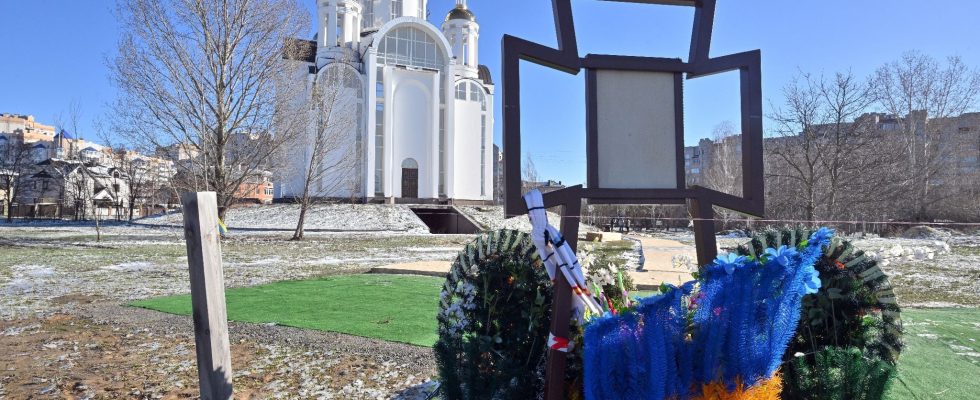A pine forest surrounds the Irpin cemetery. For a long time, nature on the outskirts of the capital has attracted Ukrainian families seeking peace and quiet in this affluent town on the outskirts of kyiv. Behind the peaks new buildings emerge, a sign of galloping urbanization. For a month, in February and March 2022, Irpin found itself separated from its twin town of Boutcha, not only by a river, but also by a front line. It was here that the Russians were stopped in their attempt to take the capital “in 72 hours”, leaving nearly 100,000 inhabitants facing tragedy: the Russian occupation in Boutcha, the fighting in Irpin.
Two years after the failed operation, the rumble of bombings has given way to the sounds of cranes and chainsaws, the sirens of reconstruction. The flapping of flags on soldiers’ graves in the wind has replaced that of automatic weapons. But there is a sound that still floats in the cemetery: the funeral song. In this sweet month of February, the liturgical voice of the Orthodox pope drowns out the muffled tears of bereaved families. There was a time when his voice resonated every day.
In 2022, nearly 458 people were killed during the occupation, most of them shot, tortured or beaten to death, or one in 10 inhabitants among the approximately 4,000 inhabitants (compared to 39,000 before the war) who remained in Boutcha.
In the shadow of God
Ihor Horodetsky is one of these people. On March 6, this resident of Boutcha left his home, near the river. We never saw him again. His father Mykola searched for him for two years, hoping he was still alive. Two years after the massacre, around sixty people remain missing.
During the occupation, the inhabitants of Boutcha no longer knew what to do with the bodies lying in the street, the morgue was full. With the priest, some therefore decided to bury them in the shadow of God, behind the Saint-André church. It was only after the liberation that the bodies – sometimes only fragments – could be exhumed, like that of Ihor. The latter was first identified by mistake by a woman from Khmelnytskyi who, believing she recognized her brother, buried him 350 kilometers away. Several months later, a DNA test proved that the one she had buried was not her brother, but Ihor. After a bureaucratic quest as absurd as it was painful, Mykola was finally able to recover her son, whose ashes have just been buried a third time, alongside his mother’s grave, in Irpin. About fifteen people came. A final point which will allow Mykola to mourn.
In Boutcha, 3,156 buildings were damaged by bombing. Half has already been rebuilt. Vokzalna Street – littered with bodies and charred Russian tanks during the liberation – small charming cottages line up. Their reconstruction was financed by an American foundation, but the town hall still has to repair the interior. In the streets, families walk with their children, doing their shopping. The McDonald’s has reopened, not far from the old mass grave.
Reconstruction advances
But behind the appearance of normality, no one forgets these 32 days of occupation. Eva and Oleksandr Koutyk, a retired couple, sunbathe in the park, now cleared of mines. The Russians lived in their home during the occupation, then they looted everything. The windows were blown out by the explosions. “The reconstruction is progressing. In some neighborhoods everything is almost finished. But the question is not how quickly it was rebuilt, but rather whether all this will be repeated,” breathes Oleksandr, pessimistic. “Don’t say that,” his wife repeats, immediately drying her tears with a tissue. “The Russians have come to kill, they do not want to negotiate, to stop the war. They want to see their army here,” retorts the sixty-year-old. On the outskirts of the city, the reinforced positions, the networks of trenches up to the border, remind us that the war is far from over.
“The residents are nervous, apathetic, they don’t sleep, they lack resources,” notes Svitlana Melnitchenko, a psychologist in her small office located on the first floor of a building in Boutcha. As in the four corners of the city, flowers were placed at the entrance, in tribute to a deceased resident. Near the Saint-André church, a large monument of 500 metal bricks decorated with names sits under the sun. “It’s a way to preserve memory, to remember what happened and to move forward on this new basis, our new common history.”
.
